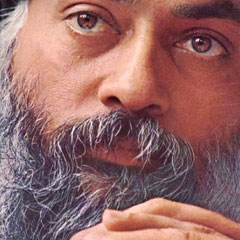Osho on the Art of Meditation

My whole life I have been talking about meditation. There are one hundred and twelve methods of meditation; I have gone through all those methods--and not intellectually. It took me years to go through each method and to find out its very essence, and after going through one hundred and twelve methods I was amazed that the essence is witnessing. The methods' non-essentials are different, but the center of each method is witnessing.
Hence I can say to you, there is only one meditation in the whole world and that is the art of witnessing. It will do everything--the whole transformation of your being.
Whatever I am doing, my meditation continues. It is not something that I have to do it separately; it is just an art of witnessing. Speaking to you, I'm also witnessing myself speaking to you. So here are three persons: you are listening, one person is speaking, and there is one behind who is watching and that is my real me. And to keep constant contact with it is meditation.
So whatever you do does not matter, you just keep contact with your witness. I have reduced religion to its very fundamental essence. Now everything else is just ritual. This much is enough. And this does not need you to become a Christian or a Hindu or a Mohammedan or anybody, and this can be done by an atheist, by a communist, by anybody, because it needs no kind of theology, no kind of belief system. It is simply a scientific method of slowly moving inwards. A point comes when you reach to your innermost core, the very center of the cyclone.
The basic element running through all the methods of meditation is witnessing.
You ask me: What is witnessing?
Whatever you are doing. For example, right now you are writing. You can write in two ways. The ordinary way that you always write. You can try another method: you can write it and you can also inside witness that you are writing it.
And you ask: Does that mean some kind of detachment?
A detachment. You are a little distant, away, watching yourself writing. So any act, just moving my hand, I can watch. Walking on the road, I can watch myself walking. Eating, I can watch. So whatever you are doing, just remain a witness.
If you have any ego, it will destroy it, because this watching is very much poisonous to the ego. It is not ego that watches. The ego is absolutely blind. It cannot watch anything. You can watch your ego. For example, somebody insults you and you feel hurt, and your ego feels hurt. You can watch it. You can watch that you are feeling hurt, your ego is feeling hurt, that you are angry. And you can still remain aloof, detached, just a watcher on the hills. Whatever goes on in the valley you can see.
So all the methods are basically different ways of witnessing. I have condensed them in a very simple way:
First, watch your actions of the body.
Second, watch your actions of the mind: thoughts, imaginations.
Third, watch your actions of the heart: feelings, love, hate, moods, sadness, happiness.
And if you can succeed in watching all these three, and as your witnessing grows deeper and deeper, a moment comes that there is only witnessing but nothing to witness. The mind is empty, the heart is empty, the body is relaxed.
In that moment happens something like a quantum leap. Your whole witnessing jumps upon itself. It witnesses itself, because there is nothing else to witness. And this is the revolution which I call enlightenment, self-realization. Or you can give it any name, but this is the ultimate experience of bliss. You cannot go beyond it.
This is the simplest. And because it can be done without in any way interfering with your everyday life, because it is something that you can go on doing the whole day. Any other method you have to take some time apart for it. And any method that needs one hour or half an hour to sit and do it is not going to help much, because twenty-three hours you will be doing just the opposite. And whatever you have gained in one hour will be washed away in twenty-three hours.
This is the only method that you can continue around the clock. While falling asleep you can go on witnessing, witnessing, that the sleep is coming, coming, coming, that it is getting darker and the body is relaxing. And a moment comes when you can watch that you are asleep. And still there is a corner, a space in you which is awake.
When you can watch yourself twenty-four hours, you have arrived. Now there is nothing to be done. Then witnessing has become natural to you. You don't have to do it. It will be simply like breathing, happening to you.







